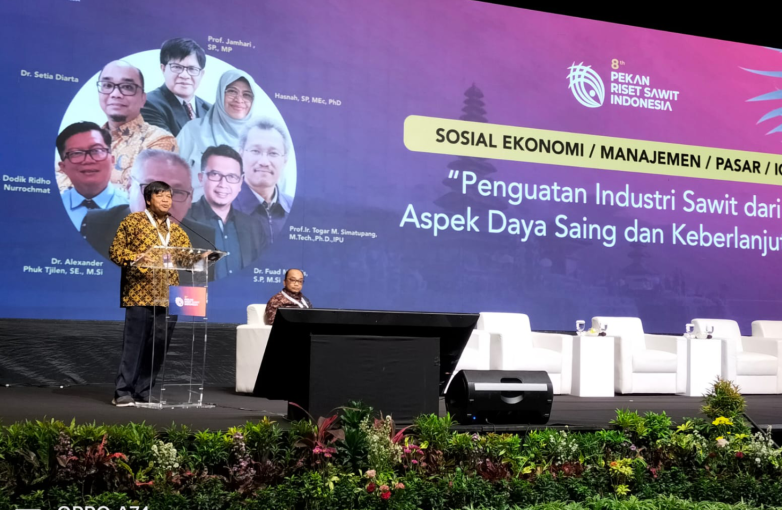
On October 3-4, 2024, Prof. Dr. Jamhari, S.P., M.P., a Professor from the Agricultural Economics and Agribusiness Study Program, Department of Agricultural Socio-Economics, Faculty of Agriculture UGM, was invited as a speaker at the 8th Indonesian Palm Oil Research Week (PERISAI) 2024. The event, held in Nusa Dua, Bali, carried the theme “Green Gold: Transforming Palm Oil Industry through Cutting-Edge Technologies” and aimed to showcase the latest research innovations to stakeholders in the palm oil industry, including government, private sectors, academia, and the broader public.
Prof. Jamhari delivered a presentation titled “Technical Efficiency of Smallholder Palm Oil Plantations in Indonesia.” In his talk, he highlighted that smallholder palm oil plantations still have significant potential to increase productivity by improving management practices without changing the existing technology. Furthermore, he emphasized that inefficiencies can be reduced through education, training, and the strengthening of cooperative and farmer group institutions.
The event attracted more than 700 participants, including representatives from government agencies, industry associations, academia, and palm oil industry practitioners. PERISAI 2024 also featured various technological innovations supporting industry sustainability, such as biosneakers, supercapacitor batteries, electric motorcycles, and electric-powered fresh fruit bunch carriers.
In addition to plenary sessions addressing industry policies and strategies, PERISAI 2024 hosted seminars divided into six topics, covering bioenergy, environment, biomaterials, cultivation and post-harvest, food and health, and the socio-economic aspects of the palm oil industry. Prof. Jamhari contributed to the session on “Strengthening the Palm Oil Industry from the Perspective of Competitiveness and Sustainability,” where he encouraged participants to focus on improving technical efficiency and sustainable development in facing global challenges.
Prof. Jamhari’s participation in PERISAI 2024 contributes to the achievement of several Sustainable Development Goals (SDGs). First, SDG 12: Responsible Consumption and Production, where more efficient management of palm oil plantations helps reduce resource inefficiencies and promote sustainable farming practices. Second, SDG 8: Decent Work and Economic Growth, through the strengthening of cooperative and farmer group institutions that can improve the welfare of smallholder palm oil farmers. Third, SDG 13: Climate Action, where research on palm oil waste management and emission mitigation supports efforts to reduce the environmental impact of the palm oil industry.
Author: Adhika Hafizh Prasada, S.P.
Admin of the Website for the Department of Agricultural Socio-Economics, Faculty of Agriculture, UGM
